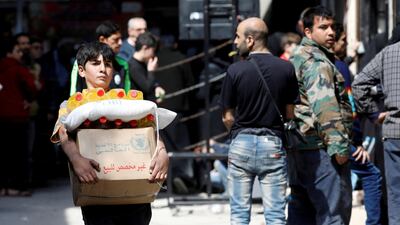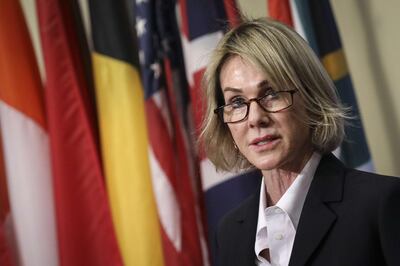Russia and China on Friday vetoed a last-ditch attempt by western members of the UN Security Council to extend for six months the delivery of humanitarian aid to Syria across its border with Turkey.
The two vetoes blocked the German-Belgian resolution despite the support of the 13 other members who all voted in favour.
This is the second veto this week by Russia and China on the resolution, and the six-year-long UN mandate for aid deliveries is set to expire on Friday.
The UN says the aid deliveries from Turkey are a "lifeline" to millions of Syrian civilians living in the country's rebel-held north-west.
Russia and China, allies of the Assad regime, want to cut the number of border crossings to one, arguing those areas can be reached with humanitarian help from within Syria.
Later on Friday the council voted on a Russian draft text to approve aid deliveries for one Turkish crossing for one year, but it failed after only garnering four votes in favour.
Diplomats said work would continue to see if a compromise could be reached among council members.

The Security Council first authorised the cross-border aid operation into Syria in 2014, which also included access from Jordan and Iraq. Those crossings were cut in January due to opposition by Russia and China.
Before the vote, US Ambassador to the UN Kelly Craft told The National that her country wanted to stop Russia and China from politicising humanitarian assistance.
"We have been working all hours, day and night, to make certain that the members of the council understand the importance of not allowing Russia and China to politicise the humanitarian assistance in order to prop up the Assad regime," Ms Craft told The National during a media briefing on Thursday. "We are going to be fighting for as to save as many lives as possible, and that means that we will be fighting for the two borders for a six-month time."
With the veto and the mandate expiring on Friday, the Security Council was due to discuss more amendments as a last resort to find a way forward.
Humanitarian organisations have warned of an aggravated humanitarian catastrophe for the large numbers of displaced people living in Syria's Idlib province if the resolution is not extended.
Amnesty International called the failure to pass a resolution and the successive vetoes “despicable”.
Friday’s veto was Russia’s 16th on Syria since the conflict started in 2011.
Experts are calling the Security Council's paralysis on the issue deeply worrying.
"With the cross-border mechanism expiring tonight, today's veto is deeply worrying. All week, UNSC members have been trying to find a way forward to extend the cross-border aid operation," said Emma Beals, an independent researcher and editor at Syria in Context.
On Thursday, the north-western Idlib province reported its first Covid-19 case, sparking fears that an outbreak of the virus could wreak havoc on an already poverty-stricken and economically deprived part of the country.
Russia wants aid deliveries to go through its ally, Damascus, but that aim is seen as unacceptable by other Security Council members given the regime's behaviour in politicising aid deliveries.
“The resolution was only ever needed because of the Syrian regime’s policy of weaponising aid and starving its opponents into submission,” Ms Beals said.
The last ditch hope now would be for “UNSC members to reach a workable agreement in the coming hours and days,” the expert said. But, she added, given the politics, “any compromise will be less than the mandate that is required to serve Syria’s north-west and north-east”.




